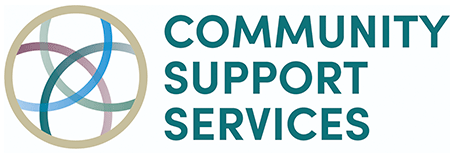Betty Martin is a Recovery Specialist in the Wellness Program at Community Support Services. She describes this as being a peer support specialist, but further explains that it is like being an all encompassing resource for clients – from getting them to and from the YMCA, to being someone they can talk to and share their feelings with. She stated she is “someone who understands because I suffer from mental illness. I have a more acute understanding of the issues. I have a shared empathy, and I understand the stigma.”
Betty has clinical depression and anxiety. She worked for a long time as a registered nurse until her illness and the job itself became too overwhelming. She experienced some hospitalizations due to stress from her job and home life. As she struggled to find a job, Betty decided to go on Social Security Disability. She explained that no one wanted to hire her after she had missed a lot of work due to her illness. As Betty had always been a hard worker, she wanted to rejoin the workforce. She recognized she could no longer be a nurse due to her physical and mental health challenges. Her counselor at Portage Path referred her to the Supported Employment Services program at Community Support Services. With the assistance of this team, she was able to explore career options.
As Betty was working with the Supported Employment program, Community Support Services had an opening for Recovery Specialist. Betty stated, "It has been such a perfect fit for me." She remarked, “I feel like I can share my knowledge, and be a good resource. I can still do what I’ve always done, and that is to help people and give support.” She also explained that being in her position has proven to be a part of a two-way street. “I get a lot of support from my clients too, we share our hopes, and dreams. And the everyday stuff too.”
In August, Betty will celebrate her 64th birthday. She plans to keep working as long as possible. She said someone recently asked her when she would retire, but her response was that “as long as my health holds out, I think I’ll stay on here for a while.” She also wants to get involved in more programs and training opportunities to educate and develop her skills as a Recovery Specialist in the agency's Wellness Program. She wants to continue participating in the group activities which are provided by the Wellness Program, such as the group for Chronic Disease Self Management. She explained that groups like this help the clients work on their health issues, and how to better work through problem solving, independent actions and decision making.
Betty describes herself as being dependable, able to embrace change and goal oriented – all of which are great qualities for a Recovery Specialist. She said that she has always been a people person, and her favorite part of working at Community Support Services is the interpersonal interactions. From her coworkers to her clients, Betty appreciates the time she is able to spend with them out in the community, and the relationships she has built here. She added that the Wellness Program is great because when clients start working out, it not only helps their physical health, but it also helps mentally and with building relationships. “I think people are better at improving their health through exercise when they are supported by a group of friends, instead dealing with it by themselves,” she explained.
